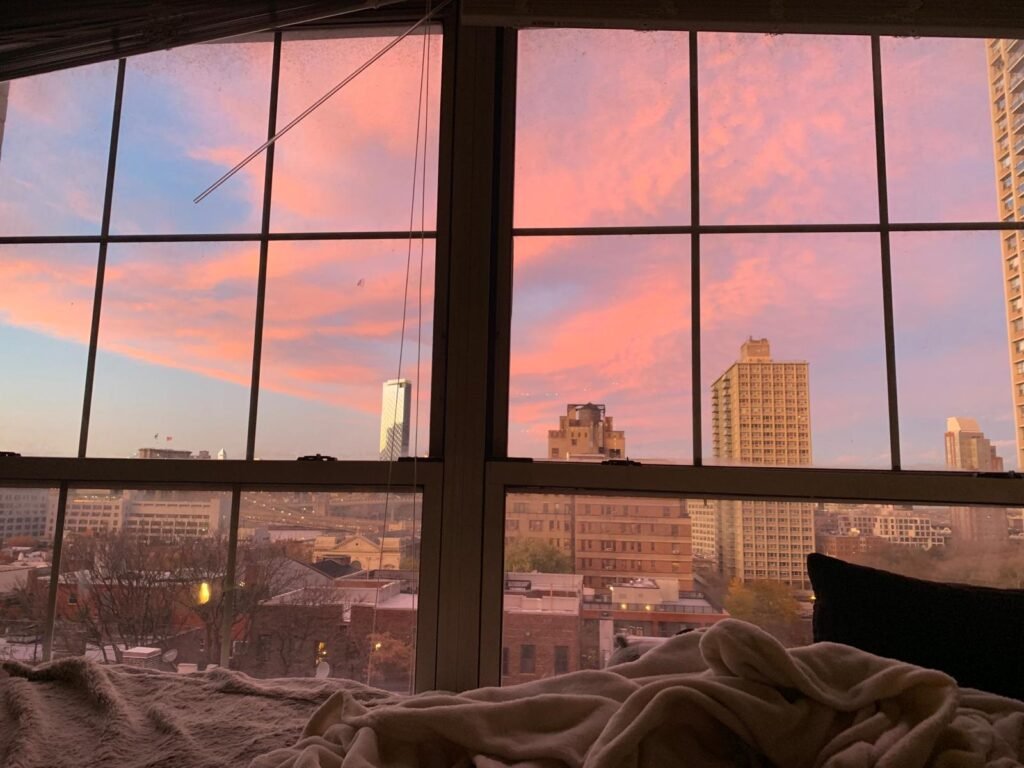The Alarm That Changed Everything
It’s 7:55 a.m.
My alarm goes off and I start to panic until…
I realize I’m unemployed.
I don’t need to wake up at this time anymore. It's easy for me to just go back to sleep and wake up a few hours later but I remembered that I quit for a reason.
I wanted to build my dream life. I left corporate; a safe job, great people, and no financial worries to take a huge risk. I'm still not completely sure if this was the right choice.
But then, I remember why I’m doing this. Why I’ve been waking up at this ungodly hour. And why I'm so much happier now.
I'm building my dream life. Something where I have control of my time again. Something where I'm working more than I ever was before but it feels like I'm barely working at all. It's a dream that’s been sitting in the back of my head as I just worked on it in the few hours that I had after work, but now I’m able to fully dedicate each day to making it come to life.
I'm building an app to help people bring awareness to their own emotions and share these thoughts with others, without a certain guarantee that everyone will love it. I've interviewed and had coffee chats with a lot of people and they all love the idea, but I have no guarantee that the masses will feel the same way. However, as long as this app can help even at least one person, I’ll have left a positive impact in the world.
So now, I drag myself out of bed without the dread of continuing an endless 9-5, but with an excitement that this is the start of my journey. This is my life now.
Morning Routine Experiments: What Works (and What Doesn’t)
When I first decided to start my business, I knew I needed to figure out a way to make time for it.
My weekdays were taken up by my 9-5, leaving only a few hours after work to work on it. Weekends were sprints, but when I adopted this approach, I no longer had a social life or any time to recover from the stress that built up during the day.
Now that I’ve left my job, I have all the time in the world to build it, but it also takes a lot more discipline. There's no one watching over my shoulder to make sure that I'm actually working on it anymore. Motivation comes purely from intrinsic motivation, with no money coming into my bank account at the end of the day. There are a few different methods I tried this past week to make myself work, let's take a look at them.
1. The “Jump Out of Bed and Go” Approach
I thought if I just forced myself to get up and start working immediately, I’d be able to do it. It would be just like my 9-5, where I autopiloted my commute to work and started clacking away at the keyboard. Spoiler alert: It didn’t work. Instead, I spent the first hour staring blankly at my screen, trying hard to resist the temporary dopamine boosts of playing Teamfight Tactics or League of Legends first thing in the morning.
Verdict: Fail.
2. The “Meditate and Manifest” Routine
Next, I tried starting my day with meditation and yoga. After brushing my teeth, I'd lay out my yoga mat, then stretch and wake up a little bit for 15 minutes. It felt nice, but by the time I was done, I felt like I had already done something so productive that it warranted a bit of game time. I think this can work, but only after it's become something as habitual as brushing my teeth first thing in the morning.
Verdict: Possible, but need to get to work right after.
3. The “Just Start” Method
This is where I’m at now. I wake up, resist doom-scrolling, brush my teeth, do some yoga, and then just sit down at my computer. I leave my phone in the living room and just open the list of tasks that I need to get done within the day. Just me, my computer, and the quiet hum of the early morning. As long as I remove all of the other distractions and have a task list from the night before, starting to work usually gets me to tap into a full hour of deep work.
Verdict: It works when I'm able to start.
Productivity Struggles: When Your Brain Refuses to Cooperate
Honestly, building a business at 5 a.m. is hard.
Actually, building any sort of long-lasting business is hard, no matter what time it is. It's actually something I'm learning about in the Millionaire Fast Lane by M.J. DeMarco, one of the many business books that I'm currently reading. Being able to start a business with minimal resistance violates the commandment of entry.
How easy would life be if anyone could start a million-dollar business at the snap of their fingers?
There's always going to be obstacles, and as promised, I'm not holding any of it back. I'm not only sharing why it's great to start and own your own business but the difficulties that make me wonder if I made the right decision.
1. Decision Fatigue
By the time I get through half the day, I've already made so many design, business, or tech decisions. How am I supposed to build this all on my own, even with the help of AI? I'm able to use AI to help me do research and shorten the amount of time that it takes to do certain things, but I still need to make all these decisions in the end.
What should I prioritize today? Should I tweak the website or work on marketing? By mid-day, I’m already exhausted from having to juggle a million things.
2. The Guilt of Not Doing Enough
There’s always this nagging voice in the back of my head telling me I’m not doing enough. I should be working harder, faster, better. Why take breaks when you could spend that time being productive?
However, as you all know, mindlessly working usually isn't the answer. Breaks are essential to keep you mentally insane, especially in the crazy world that we have right now.
Every day is a constant battle to remind myself that progress is still progress, no matter how small each task is. Think about it like compound interest, all these small things will grow into a huge snowball at one point!
3. The Temptation to Quit
Some mornings, I wake up and think, Why am I even doing this?
I have bills to pay. I have a family who expects me to have a full-time job. Worst of all, I don’t know when any of this will give me my first dollar.
It’s lonely, it’s exhausting, and it feels like I’m not getting anywhere.
Productivity Wins: Small Victories That Keep Me Going
Despite the struggles, there are always moments of triumph. Little wins that remind me why I’m putting myself through this.
1. The MVP
When trying to build an app, I realized that I needed the help of someone who needed to code. When I got my friend aboard to help me figure out how to make my vision a reality, it was amazing! He started working on a minimum viable product (MVP) that would serve as our proof of concept and seeing the first page come together was the happiest that I had felt in a while.
It was proof that this might happen. It wasn’t all speculation anymore. I was one step closer to making my dream a reality.
2. Finding My People
Recently, I’ve been feeling a little low on the drive to keep going. When this happened, I realized that I needed to surround myself with people who also wanted to build their own business and personal brand. I think it’s time to start reaching out and connecting with others. I messaged a friend who’s trying to create a name for himself in the mental health space and seeing his drive motivates me as well!
3. Learning to Let Go
The big picture is pretty daunting, and I’ve realized that some of the features I want incorporated in the app might not be the best thing for it. I’ve done a few surveys and it seems like the features that I thought would be a hit aren’t wanted by my users. That’s okay! I can let go of a few of these visions to make the big one come to life, and that’s enough for me.
Review: “Atomic Habits” Morning Routine Chapter
I recently re-read the morning routine chapter in James Clear’s Atomic Habits, and it helped me get my energy back on track. He emphasizes the importance of starting your day with intention and building systems to help get to your goals, and I’ve created a few recurring timeslots on my calendar to help me do so..
Here’s what stuck with me:
1. Starting with Small Wins
Clear talks about the importance of starting your day with a small win, like the 10-minute session of yoga in the morning or stretches that help me start the day. Doing something productive gets the momentum going for the whole day.
I do find that the short 10-minute yoga session gives me a bit of drive to keep creating content and working on the app as opposed to if I were to start my day with a game of League of Legends. It’s a small act, but it brings me onto the right track and makes a big difference for the entire day.
2. Habit Stacking
One of my favorite tips from the book is habit stacking—pairing a new habit with an existing one. For instance, every single time that I walk into my small office space, I do a few pushups before I enter the door. It gets my blood going and keeps me slightly active before sitting at my computer for a few hours. It’s a small ritual that gets me into the mood to work while maintaining a nice healthy habit.
3. The Importance of Environment
Last, for now, he emphasizes the role of your environment.
Previously, I used to have my desk in my bedroom, and it would be really easy for me to just roll out of bed and maintain that same mindset while starting to work. I would be tired, groggy, and not ready for a full day.
Now, I’ve moved my desk over to a separate area in my living room for a dedicated workspace. It’s nothing crazy, but having an area of the house dedicated to just focus work gets me into the mindset of working instead of just playing all day.
I don’t wake up at 5 AM in the morning.
Whenever I watch this productivity YouTube, they always preach the morning hustle. They wake up at dawn before the sun is up, meditate, work out, and eat a good breakfast, and it seems like this is the lifestyle that you have to pursue to become successful.
That’s not really it for me. There’s a level of discipline that I see in that routine but it’s not my reality at all. I’m not even sure if I’ll ever reach that stage, or if I even need to.
My reality is messy. It’s typing with one eye open because I’m still not fully awake yet. It’s skipping breakfast because I’m too lazy to do so and starting the day with some video games. Sure, I could definitely be more disciplined, but I also want to live in the present a little bit. I’m sacrificing some of the time that I could be spending with friends or playing video games but I’m not going completely cold turkey.
I think that’s okay.
Every morning, I choose to chase my dreams even when it’s hard or when I’m super tired. I still work towards the big goal every day without throwing my life away. It might take me a little longer to reach the promised land, but to me, the promised land is also now. I believe in enjoying the journey that takes me there without losing everyone around me at the moment.
At the end of the day, I’m aiming to build a life that I want. I want to chase my dreams. I want to prove to myself that I can take this risk and do something that’s hard and unconventional. If I’m sacrificing my life now to go full-steam towards building this business, will I regret the memories that I could have made today?
Life is hard. But don’t forget to enjoy it.




